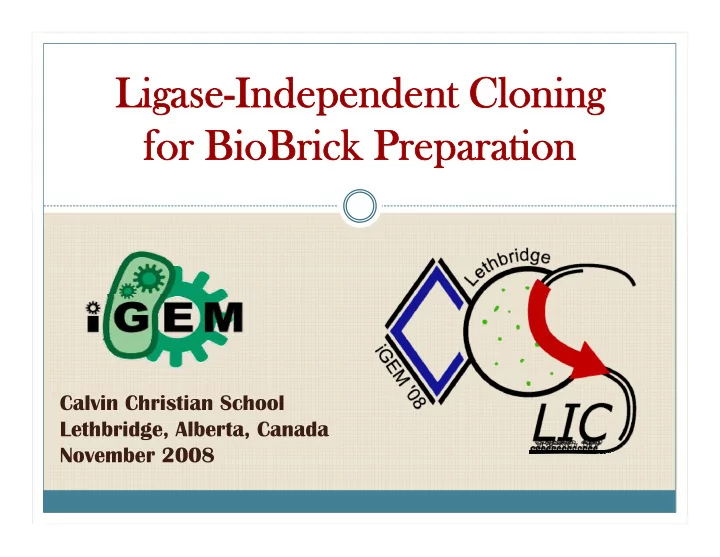

Ligase-Independent Cloning Ligase-Independent Cloning for BioBrick Preparation for BioBrick Preparation Calvin Christian School Lethbridge, Alberta, Canada November 2008
Lethbridge CCS Team
Lethbridge Edmonton Calgary Lethbridge, Alberta, Canada (USA)
Standards x BioBrick definition - prefix & suffix x BioBrick composition BioBrick creation EcoRI XbaI PstI SpeI
Ligation-Independent Cloning • Proposed new standard uses ligation-independent cloning (LIC) • Reference: Aslanidis, C. & de Jong, P.J. (1990) “ Ligation- independent cloning of PCR products (LIC- PCR).” Nucl. Acids Res. 18 :20, 6069-6074.
Current (Soon-to-be-Old ☺ ) Method Legend DNA PCR Primer Restriction site - blunt - sticky Restriction enzyme
Current (Soon-to-be-Old) Method Restriction sites: Eco RI Pst I Spe I Xba I
LIC method - insert PCR
LIC method - plasmid
LIC method: T4 polymerase treatment T4 DNA polymerase dCTP
LIC method: T4 polymerase treatment Mix +
Result of LIC procedure • backbone nicks repaired in vivo by E. coli ligases after transformation
Making the LIC plasmid PCR
Recircularized LIC plasmid BioBrick part: K155000
GFP Trial � Attempted transformation using LIC method � Colonies grew, but no green fluorescence observed � No time to carry out further trials… .
EcoRV digestion of pSB_LIC 1kb Sample Sample Sample Sample 1kb Ladder A B C D Ladder Cut / Uncut Cut / Uncut Cut / Uncut Cut / Uncut 2.5 kb 2.0 kb 1.5 kb 1.0 kb pSB_LIC: 2066 bases
Conclusion � Proposed standard method x BioBrick definition for BioBrick preparation - prefix & suffix � (In principle) easy to implement � Readily automated x BioBrick composition � pSB_LIC now available x BioBrick creation in the Registry... Try it out!
Future Directions � Klenow fragment of DNA polymerase I also has 3’-5’ exonuclease activity, and is cheaper than T4 � Optimize conditions for T4 DNA polymerase treatment
Acknowledgements � Thanks to... � Nathan Puhl � Dr. Hans-Joachim Wieden � Dr. Brent Selinger � University of Lethbridge iGEM team
Questions?
Origin of replication Eco RV Restriction enzyme Ampicillin resistance Double transcriptional terminator Restriction sites: DNA sequence Eco RI Restriction site Pst I Spe I Xba I primer
Double terminator site E coRI X baI S peI P stI Ampicillin resistance Origin of replication
� We are then our religating our plasmid. We’ll transform the Lic vector, grow it up, to ensure that it religated properly. We’ll transform the plasmid into ecoli and grow the cells. The GFP will then become visible.
Application
Proof of Principle � The whole process of designing it, how we did it � First considered using T4 polymerase , now using Klenow fragment of DNA Pol I, cheaper with the same effect (200x less effective as 3’-5’exonuclease)
Paul Vanden Broek • NorQuest college • Work in care home
Elizabeth Van Essen • U of L student- General Science/ Pre-Ed
Paul Vanden Broek Team Members Peter Van Herk Elizabeth Van Essen
Supervisors & Sponsors Marc Slingerland Glenda Bron Dr. HJ Wieden Nathan Puhl
Bio-engineering Hardware Software Computation Organism DNA Output
Engineering approach BioBrick standard - standard format - standard assembly
Recommend
More recommend